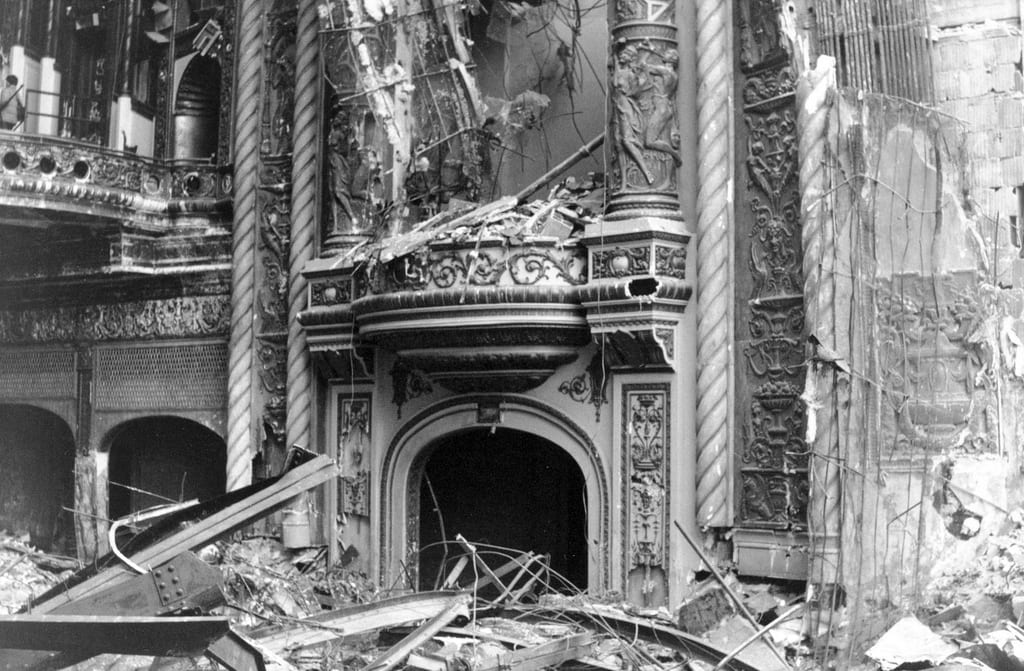Half-Penny, Two-Penny / A.D. 1958 / State Street Sadie
Half-Penny, Two-Penny
Written by James Young
Lead Vocals by James Young
Half penny, two penny, gold Krugerrand
He was exceedingly rich for such a young man
Sad story, old story
Bring out the band
Another divorce just a few hundred grand
Half penny, two penny, back of the queue
Yes mister poor man this means you
Justice for money what can you say
We all know it's the American Way
Yes, I'm gonna shake myself loose
Back home across the sea
Where I know that I will be free
Half penny, two penny, back in the States
You just couldn't take that African pace
Yes, Mrs. Cleaver your son's home to stay
We all know it's the American Way
Yes, I'm gonna shake myself loose
Back home across the sea
Where I know that I will be free
"Come here - hey Angelo... what's happenin'?"
"Hey, Stosh, good to see ya"
"What the hell you doin'?"
"We're tearing this old building down here"
"Oh you're kiddin' me. Remember when we were kids, and we used to come here every Saturday afternoon to see a cartoon?"
"Yeah, I remember"
"Well what's she lost to?"
"Who knows- politicians, taxes...it's a disgrace"
"I'm not surprised, they make me sick. They don't make theaters like this any more."
Half penny, two penny, ashes to dust
The almighty dollar says "In God we trust"
Justice for money how much more can I pay
We all know it's the American Way
Yes, I'm gonna shake myself loose
Back home across the sea
Where I know that I will be free
(I want to be free)
Yes, I'm gonna shake myself loose
Back home across the sea
Where I know that I will be free
(We all want to be free)
A.D. 1958
Written by Dennis DeYoung
Lead Vocals by Dennis DeYoung
And so, my friends, we'll say goodnight,
for time has claimed his prize,
but tonight can always last,
as long as we keep alive,
the mem'ries of Paradise
State Street Sadie
Written by Dennis DeYoung
[instrumental]
Interpretation
Here it is in JY's own words, from a December 9, 1999 on-line chat at Yahoo!:
Looking a little more closely at the lyrics:
He was exceedingly rich for such a young man
Sad story, old story
Bring out the band
Another divorce just a few hundred grand
While divorce is a problem at all levels of society, it seems that divorce of convenience among the rich and famous is the norm, even when there will be a large financial payment to the former spouse.
Half penny, two penny, back of the queue
Yes mister poor man this means you
Justice for money what can you say
We all know it's the American Way
In the above interview, JY refers to perhaps the most famous example (although it didn't occur until 1995): when O.J. Simpson was tried and acquitted of murder charges, it was clear that it was only possible because he could afford the best defense lawyers for his case. So many other people have to rely on public defenders who don't have the time or resources to mount a defense when there is a preponderance of evidence against the accused.
Yes, I'm gonna shake myself loose
Back home across the sea
Where I know that I will be free
Throughout American history people have come to America seeking opportunity and freedom. Often that was freedom from oppression or religious persecution, but there was also always hope that in a free society they could achieve their dreams of success as well.
Half penny, two penny, back in the States
You just couldn't take that African pace
Perhaps the rich man in South Africa was an American capitalizing on the opportunity to make money in the trade of South African gold. At some point, having plenty of money and dissatisfied with life, he moves back to America to live a life of luxury.
Yes, Mrs. Cleaver your son's home to stay
We all know it's the American Way
"Mrs. Cleaver" is referring to the mother on the T.V. show Leave It To Beaver, which ran from 1957-1963 and was in reruns for decades. Life for the Cleaver's was simple, as a middle class family with all their needs met but not having an extravagant lifestyle. That is an ideal for many Americans.
The dialogue during the instrumental interlude ties into the theme of the Paradise Theatre album, as the theatre is being torn down, the men are talking about seeing movies there as kids.
A.D. 1958 is an epilogue to the Paradise Theatre theme, representing the final curtain call before demolition of the Theater. Built to last forever, the Theater barely lasted a generation. As with all things, though, they never truly die as long as we hold on to the memories.



Half Penny Two Penny is a favorite song of mine. JY is such a great writer and singer. Great interpretation.
ReplyDelete